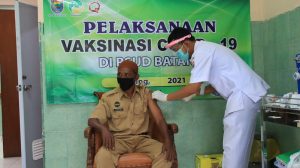The Indonesian government has laid out plans to drastically speed up the distribution of COVID-19 vaccines as the country battles continuing outbreak of the virus, setting an ambitious target of 1 million vaccinations per day by next month.
Speaking to reporters yesterday in Depok, outside the capital Jakarta, President Joko “Jokowi” Widodo said that he hoped the nation would hit 700,000 doses a day this month and then rise again. “So in July, we can achieve the vaccination target per day of 1 million,” he said, according to Reuters. Over the past week, Indonesia has distributed about 260,000 inoculations per day, according to figures from BNPB, its national disaster mitigation agency.
Indonesia is already the worst affected nation in Southeast Asia, having reported 1.87 million infections and 51,990 deaths, and the region’s fourth-most affected country relative to population.
Given its inability to get the virus fully under control, the Indonesian government has been proactive in seeking to procure vaccines to inoculate its 270 million people. Like many of its Southeast Asian neighbors, it has relied heavily on the Chinese firms Sinovac and Sinopharm, but has also secured shipments of vaccines from the U.S. company Moderna and the U.K.’s AstraZeneca.
In January, the government began its nationwide campaign to vaccinate 181.5 million people during the course of 2021, but the vaccine rollout has been hampered by supply and logistical issues. As of June 8, just 18.26 million Indonesians had received at least one dose of COVID-19 vaccine, an number equivalent to just 6.68 percent of its population.
But the sluggish vaccine rollout has been given fresh impetus by the continued spread of COVID-19. Having barely contained the last wave that peaked in January and February, the country sits on the brink of a fresh wave of infections, due to the spread of more infectious variants and a spike resulting from travel during last month’s Eid al-Fitr holiday. Jokowi’s comments came the same day that Indonesia recorded 7,725 new coronavirus infections, the largest single-day spike since late February.
Seventeen of the country’s regions are currently classified as “red zones,” which are subject to bans on public gatherings of more than three people and an 8 p.m. curfew, while Indonesian authorities have drafted in more doctors and nurses to two areas on the islands of Java and Madura that have seen particularly large clusters of cases.
Meanwhile, health authorities have banned Indonesian Muslims from making the haj pilgrimage to Saudi Arabia, sinking for a second year running a local travel industry worth some $3 billion per year. They have also opened COVID-19 vaccinations to anyone aged over 18 in Jakarta, one of the centers of the recent outbreaks, in order to fast-track the capital toward herd immunity. Officials expect that cases will likely continue to grow continue throughout June and July, but hope that a speedy vaccination distribution will help bring numbers down.
Jokowi’s target of 1 million vaccinations per day is optimistic to say the least. As of May 31, Indonesia had nearly 76 million doses of ready-to-use vaccines, according to Reuters, but actually getting them out to the population will face many of the same problems that have hampered distribution so far: from limited medical personnel to the challenges posed by the country’s dispersed island geography.
But there’s a good chance that the Jokowi administration has learned something from the challenges of the past year. Even if it fails to reach its self-imposed target, which is probably likely, the government clearly recognizes that the only safe haven for Southeast Asia’s largest nation is one in which the nation achieves rapid widespread vaccination – as quickly as possible.
































